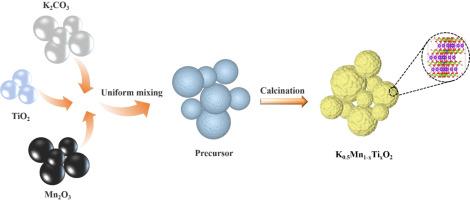Stable electrochemical properties of trace titanium doping layered P3-type K0.5Mn0.92Ti0.08O2 cathode material for potassium ion batteries
IF 8.9
2区 工程技术
Q1 ENERGY & FUELS
引用次数: 0
Abstract
The wide application of potassium ion batteries (PIBs) urgently requires the development of ideal cathode materials with low cost, good reaction kinetics and structural stability. Here, a titanium-doped K0.5Mn0.92Ti0.08O2 cathode material for potassium ion batteries is developed by doping modification strategy using a high-temperature solid-state method. The structure and performance structure-activity relationship of binary K0.5Mn1-xTixO2 cathode materials doped with non-electrochemically active element Ti4+ are studied experimentally and theoretically. With the introduction of Ti4+, when the doping amount is <10 mol%, the doped solid solution is hexagonal P3 phase, and the transition metal layer spacing increases. The non-equivalent doping affects the relative content of Mn3+/Mn4+, smoothes the redox peak in the electrochemical process, reduces the doping formation energy, and improves the structural stability. The ex-situ XRD fine structure study of the electrochemical process shows that the structural change of the material during the discharge process is suppressed after doping. The best Ti-doped cathode material K0.5Mn0.92Ti0.08O2 has an initial discharge capacity of 126.9 mAh·g−1 at a current density of 20 mA·g−1, and the capacity retention rate is 53.7 % after 100 cycles. This work provides a feasible strategy for the construction of stable electrode materials for PIBs.

用于钾离子电池的微量钛掺杂层状 P3 型 K0.5Mn0.92Ti0.08O2 正极材料的稳定电化学特性
钾离子电池的广泛应用迫切需要开发出成本低、反应动力学好、结构稳定的理想正极材料。本文采用高温固态法,通过掺杂改性策略,开发了一种掺钛的 K0.5Mn0.92Ti0.08O2 钾离子电池正极材料。实验和理论研究了掺杂非电化学活性元素 Ti4+ 的二元 K0.5Mn1-xTixO2 正极材料的结构和性能构效关系。随着 Ti4+ 的引入,当掺杂量为 <10 mol% 时,掺杂固溶体为六方 P3 相,过渡金属层间距增大。非等量掺杂影响了 Mn3+/Mn4+ 的相对含量,平滑了电化学过程中的氧化还原峰,降低了掺杂形成能,提高了结构稳定性。电化学过程的原位 XRD 精密结构研究表明,掺杂后材料在放电过程中的结构变化得到了抑制。掺杂钛的最佳阴极材料 K0.5Mn0.92Ti0.08O2 在电流密度为 20 mA-g-1 时的初始放电容量为 126.9 mAh-g-1,循环 100 次后容量保持率为 53.7%。这项工作为构建稳定的 PIB 电极材料提供了可行的策略。
本文章由计算机程序翻译,如有差异,请以英文原文为准。
求助全文
约1分钟内获得全文
求助全文
来源期刊

Journal of energy storage
Energy-Renewable Energy, Sustainability and the Environment
CiteScore
11.80
自引率
24.50%
发文量
2262
审稿时长
69 days
期刊介绍:
Journal of energy storage focusses on all aspects of energy storage, in particular systems integration, electric grid integration, modelling and analysis, novel energy storage technologies, sizing and management strategies, business models for operation of storage systems and energy storage developments worldwide.
 求助内容:
求助内容: 应助结果提醒方式:
应助结果提醒方式:


